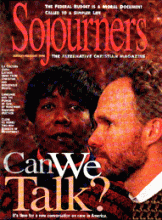The lure of "simplicity" is everywhere. Which of us does not feel his or her life is at the edge of spinning out of control sometimes, in danger of coming apart under the sheer weight of phone messages, tax receipts, birthdays, and who knows what all else to remember?
Simplicity is the watchword of management consultants who preach the benefits of KISS ("keep it simple, stupid"), of commercials that try to sell some modern product by associating it with a nostalgically half-remembered simpler life of 30 or 40 years ago, of a whole industry that tries to sell closet organizers or pocket date books on the promise that an organized life is a simpler life. A simple life is one you can control.
There's never been a shortage of books preaching this kind of simplicity in American bookstores. But more and more people, from a variety of backgrounds, are exploring a more radical approach to simplicity-the "voluntary simplicity" movement-for reasons ranging from the spiritual to the political.
Just as many of us worry we no longer have control of life's details, so many of us also have a nagging fear that we may be too busy to pay attention to the really Big Things. A morning at the park playing with the kids, a quiet afternoon walk in the country, a family dinner where miraculously everyone gets along-suddenly we're reminded that the moments of bliss are there for the taking, if we just notice them. Who hasn't wondered whether doing the day-to-day work that keeps the bills paid isn't blinding us to the abundant life we have miraculously been given for free?
Or, if rediscovering the richness of daily life doesn't draw you to simple living, perhaps the new world economy will.
Read the Full Article
